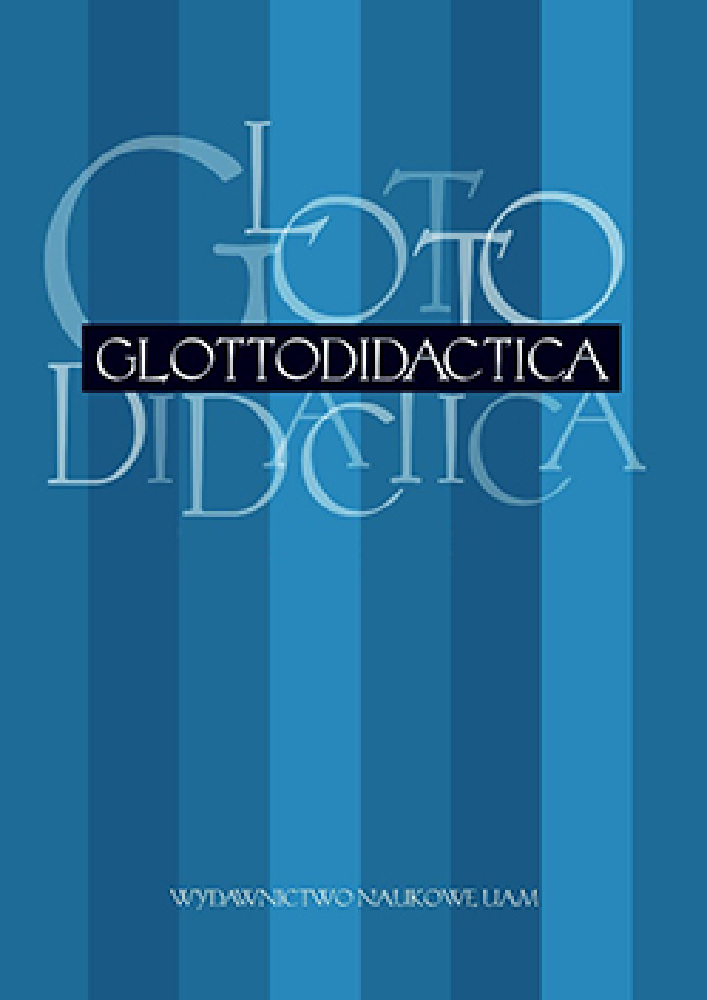Abstract
The paper examines the way and the extent to which language policies have affected the development of the Polish language especially in recent times, since the so-called end of the communist era. The discussion revolves round the Polish Language Act of 1999 which set the rules appropriate to ‘protecting’ Polish from ‘foreign influences’ (English in particular). Subject to examination is the Act’s origins, the government’s motives for it, as well as amendments the Act has undergone since it was first promulgated in 1999 and the justifications for them. Finally, the paper addresses various practical implications stemming from the Act and manifested in a number of more or less spectacular actions taken by the competent bodies and authorities in order to protect the Polish language.References
Bugajski, M. 2005. Przeszłość i przyszłość polityki językowej w Polsce. In: Gajda, S., Markowski, A., Porayski-Pomsta, J. (eds.). Polska polityka komunikacyjno-językowa wobec wyzwań XXI wieku. Warszawa: Dom Wydawniczy Elipsa, 74–81.
Buttler, D., Kurkowska, H., Satkiewicz, H. 1976. Kultura języka. Warszawa: PWN.
Cooper, R.L. 1989. Language Planning and Social Change. Cambridge: Cambridge University Press.
Fisiak, J. 1961. Zapożyczenia angielskie w języku polskim. Unpublished PhD diss. (University of Lodz).
Fisiak, J. 1986. The word-formation of English loan-words in Polish. In: Viereck, W., Bald, V.D. (eds.). English in Contact with Other Languages. Studies in Honour of Broder Carstensen on the Occasion of His 60th Birthday. Budapest: Akademia Kiodó, 253–263.
Gajda, S. 1999. Program polskiej polityki językowej (rozważania wstępne). In: Mazur, J. (ed.). Polska polityka językowa na przełomie tysiącleci. Lublin: Wyd. Uniwersytetu Marii Curie-Skłodowskiej, 37–46.
Hornbereger, N.H. 2006. Frameworks and models in Language Policy and Planning. In: Ricento, T. (ed.). An Introduction to Language Policy. Theory and Method. Oxford: Blackwell Publishing, 24–41.
Kołodziejek, E. 2008. Nowa jakość polszczyzny: zagrożenie czy szansa. In: Cygal-Krupa, Z. (ed.). Współczesna polszczyzna: stan, perspektywy, zagrożenia. Kraków: Księgarnia Akademicka, 33–40.
Lubaś W. (ed.). 1977. Socjolingwistyka 1. Polityka językowa. Katowice: Wyd. Uniwersytetu Śląskiego.
Mańczak-Wohlfeld, E. 2000. Tendencje purystyczne we współczesnym języku polskim. In: Mańczak-Wohlfeld, E. (ed.). Studia linguistica in honorem Stanislai Stachowski. Kraków: Wydawnictwo UJ, 93–97.
Mańczak-Wohlfeld, E. 2002. Polish. In: Görlach, M. (ed.). English in Europe. Oxford: Oxford University Press, 213–228. DOI: https://doi.org/10.1093/acprof:oso/9780199273102.003.0011
Mańczak-Wohlfeld, E. 2004. Does the spread of English constitute a threat to Polish? In: Duszak, A., Okulska, A. (eds.). Speaking from the Margin. Global English from a European Perspective. Frankfurt am Main: Peter Lang, 177–188.
Mańczak-Wohlfeld, E. 2008. The impact of English on Polish: Myth or truth. Kwartalnik Neofilologiczny LX, 3–8.
Mańczak-Wohlfeld, E. (ed.). 2010. Słownik zapożyczeń angielskich w polszczyźnie. Warszawa: Wydawnictwo Naukowe PWN.
Mańczak-Wohlfeld, E., Witalisz, A. The influence of English on Polish morphology, forthcoming.
Markowski, A. 2009. Kultura języka polskiego. Teoria. Zagadnienia leksykalne. Warszawa: Wydawnictwo Naukowe PWN.
Miodek, J. 2010. Słownik polsko@polski z Miodkiem. Wrocław: Wydawnictwo Marina.
Mostowski, P., Żukowski, W. 2001. Ustawa o języku polskim: komentarz. Warszawa: Wydawnictwo prawnicze. LexisNexi.
Nettmann-Multanowska, K. 2003. English Loanwords in Polish and German after 1945: Orthography and Morphology. Franfurt am Main: Peter Lang.
Przygoński, K. Sociolinguistic Aspects of the Functioning of English in Post-1989 Poland. Franfurt am Main: Peter Lang.
Walczak, B. 1987. Między snobizmem i modą a potrzebami języka, czyli o wyrazach obcego pochodzenia w polszczyźnie. Poznań: Wydawnictwo Poznańskie.
Wiertlewski, S. 2011. „Wielopodmiotowość współczesnej polskiej polityki językowej”. In Koutny, I., Nowak, P. (eds.). Language, Communication, Information 6, 99–107.
http://stowarzyszenie.wspolnotapolska.org.pl/ (ED: April, 2016).
http://www.certyfikatpolski.pl/en/ (ED: April, 2016).
http://www.rjp.pan.pl/index.php?option=com_content&view=article&id=96:co-polacy-sdzo-jzyku-polskim-wyniki-badania-cbos&catid=45&Itemid=55 (ED: May 2016).
https://linguistlist.org/issues/5/5-735.html (ED: May, 2016).
https://pl.wikipedia.org/wiki/II. Rzeczpospolita#Demografia (ED: March, 2016).
https://www.sciesielski.republika.pl/varia/mniejnar.html (ED: March, 2016).
https://www.rjp.pl (ED: April, 2016).
https://www.rjp.pl/en (ED: April, 2016).
License
Copyright (c) 2016 Marek Kuźniak, Elżbieta Mańczak-Wohlfeld

This work is licensed under a Creative Commons Attribution-NoDerivatives 4.0 International License.
Authors
Authors of texts accepted for publication in Glottodidactica are required to complete, sign and return to the Editorial team’s office the Agreement for granting a royalty-free license to works with a commitment to grant a CC sub-license.
Under the agreement, the authors of the texts published in Glottodidactica grant Adam Mickiewicz University in Poznań a non-exclusive, royalty-free license and authorize the use of Attribution-NoDerivatives 4.0 International (CC BY-ND 4.0) Creative Commons sub-license.
The authors retain the right to the free disposal of the work.
Users
Interested Internet users are entitled to use works that have been published in Glottodidactica since 2016, under the following conditions:
▪ attribution – obligation to provide, together with the distributed work, information about the authorship, title, source (link to the original work, DOI) and the license itself.
▪ no derivatives – the work must be preserved in its original form. Without the author's consent, it is not possible to distribute the modified work in the form of translations, publications, etc.
Copyrights are reserved for all texts published before 2016.
Miscellaneous
Adam Mickiewicz University in Poznań retains the property right as a whole (layout, graphic form, title, cover design, logo etc.).
Privacy statement
The names and email addresses published on this journal site will be used exclusively for the purposes declared by this journal and cannot be used for any other purpose or by any other party.




